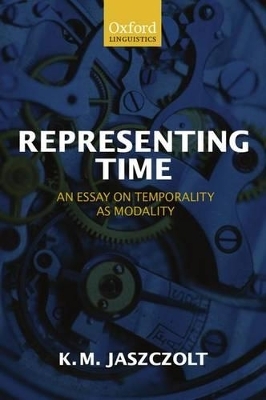
Representing Time
An Essay on Temporality as Modality
Seiten
2009
Oxford University Press (Verlag)
978-0-19-921444-0 (ISBN)
Oxford University Press (Verlag)
978-0-19-921444-0 (ISBN)
Thinking and speaking about time is ridden with puzzles and paradoxes. How do human beings conceptualize time? Why, for example, does the availability of tense vary in different languages? How do the lines of information from tense, aspect, temporal adverbs, and context interact in the mind? Does time describe events? If real time does not flow, where do the concepts of the past, present and future come from? Are they basic concepts or are they composed out of more primitive constituents? And, finally, what is the semantics of expressions with temporal reference? This book offers a new approach to the representation of meaning of temporally-located utterances and discourses. Temporality, the author suggests, should be taken to mean degrees of certainty, understood in turn as degrees of acceptability concerning the eventuality referred to in the speaker's utterance. She presents theoretical arguments and empirical evidence from Indo-European and non-Indo-European languages to show that speakers represent the past, present, and future as degrees of epistemic modality. She argues that temporality can be subsumed under the general label of acceptability or attitude and, rather like the semantic category of evidentiality, founded on the strength of evidence. In the approach she develops, modality provides basic conceptual building blocks for the concept of time and at the same time semantic building blocks for representing temporal expressions in her framework of Default Semantics. Dr Jaszczolt sets the results of her research in the context of linguistic and philosophical work in semantics and pragmatics.
Kasia M. Jaszczolt (pronounced: Yashchout) is Professor of Linguistics and Philosophy of Language at the Department of Linguistics, University of Cambridge, and Fellow of Newnham College, Cambridge. Her books include Discourse, Beliefs and Intentions: Semantic Defaults and Propositional Attitude Ascription (1999), Semantics and Pragmatics: Meaning in Language and Discourse (2002), and Default Semantics (2005).
Introduction: Thinking About Time and Living in Time ; 1. Real Time and the Concept of Time ; 2. Time as Modality ; 3. Semantic Representation of Time: A Preamble ; 4. Time in Default Semantics ; Conclusion: 'Looking Forward' Into the Future ; References ; Index
| Erscheint lt. Verlag | 26.2.2009 |
|---|---|
| Zusatzinfo | Line drawings |
| Verlagsort | Oxford |
| Sprache | englisch |
| Maße | 156 x 233 mm |
| Gewicht | 325 g |
| Themenwelt | Geisteswissenschaften ► Philosophie ► Sprachphilosophie |
| Geisteswissenschaften ► Sprach- / Literaturwissenschaft ► Sprachwissenschaft | |
| ISBN-10 | 0-19-921444-1 / 0199214441 |
| ISBN-13 | 978-0-19-921444-0 / 9780199214440 |
| Zustand | Neuware |
| Haben Sie eine Frage zum Produkt? |
Mehr entdecken
aus dem Bereich
aus dem Bereich
Aspekte einer Ontologie des Logos
Buch | Hardcover (2024)
Springer Fachmedien (Verlag)
CHF 167,95
Wie die Menschheit zu ihrer größten Erfindung kam
Buch | Softcover (2022)
C.H.Beck (Verlag)
CHF 25,20
Macht und Legitimität politischer Sprache im Prozess der europäischen …
Buch | Softcover (2023)
Nomos (Verlag)
CHF 103,60


